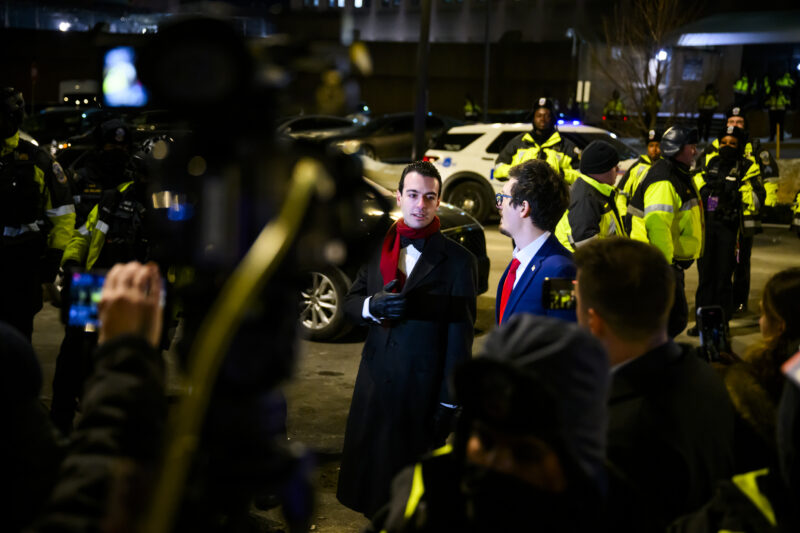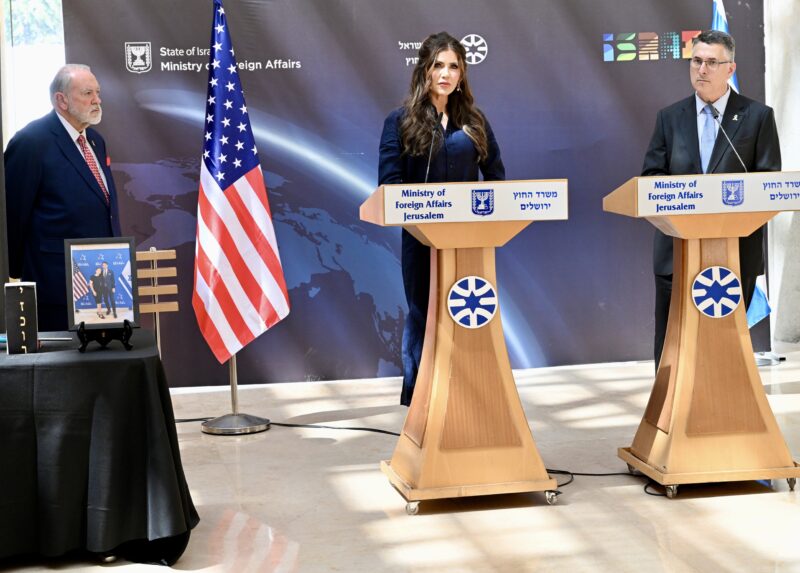Does the path to a hostage deal go through Israel’s religious Zionists?
The father of hostage Hersh Goldberg-Polin wrote an op-ed seeking to soften resistance to a cease-fire within the conservative-minded community

Saeed Qaq/SOPA Images/LightRocket via Getty Images
Israel's Finance Minister Bezalel Smotrich addresses the relatives of Israelis being held hostage during a rally.
In the weeks before the bodies of six murdered hostages were recovered from Gaza on Saturday, Israeli Prime Minister Benjamin Netanyahu was already struggling to win widespread support from within his government for a deal that would release hostages in exchange for a cease-fire and Palestinian terrorists. Some hostage families have made a concerted effort to reach out to religious Zionists to help solve the impasse, viewing them as the key constituency to bringing a deal closer.
While thousands of Israelis regularly gather to demonstrate to free the hostages and President Joe Biden pushes for a cease-fire deal, Netanyahu faces domestic pressure against an agreement, with especially strong opposition from right-wing Finance Minister Bezalel Smotrich and National Security Minister Itamar Ben-Gvir, who have threatened to topple his coalition over the issue.
The standard narrative from Netanyahu’s critics is that he is avoiding a hostage and cease-fire agreement in order to prolong his political survival. But the prime minister and his defenders argue that he is pushing for more hostages to be included in the swap, and he is holding firm on matters of national security. Netayhahu argues that Hamas has hardened its stance and rejected any deal.
Smotrich and Ben-Gvir have threatened to resign over any agreement that would include the release of large numbers of terrorists from prison and an end to the war in Gaza. Netanyahu met twice last week with Smotrich, the leader of the Religious Zionist Party, to gauge whether he would change his mind and support a deal — as he did in November — or at least quietly allow one to proceed.
Yet in opposing a hostage deal in its current form, Smotrich is “representing the dominant stance of the religious Zionist population,” Yair Ettinger, a religion reporter for Israel’s national broadcaster KAN and author of Frayed: The Disputes Unraveling Religious Zionists told Jewish Insider.
As such, relatives of some of the hostages remaining in Gaza explicitly made an effort to raise awareness of their loved ones’ plight among religious Zionists to help influence their views on a deal.
Religious Zionists are the Israeli constituency most similar in Jewish observance to Modern Orthodoxy in the U.S. But they also have a strong political representation in the Knesset, backed by mostly right-wing and strongly pro-settlement rabbis and institutions that represent a notable share of the Israeli population. Smotrich and Ben-Gvir’s parties have 13 of 120 Knesset seats, and Netanyahu’s Likud party is also popular among religious Zionists — several representatives in the party’s parliamentary ranks come from the community.
Some of the hostages’ parents met in recent weeks with Smotrich and all of his party’s cabinet ministers. They chose not to meet with Ben-Gvir and his party’s ministers, said a source with knowledge of the matter, out of a view that they were less likely to change their minds.
That hostages’ families seem to view outreach to religious Zionists as an essential element of their advocacy “shows how people view the power of religious Zionists today,” Ettinger said. “I think they’re right.”
The parents of the tatzpitaniyot (female IDF lookouts) taken hostage by Hamas, sought the advice of prominent Orthodox journalist Yair Sherki, who appears on Israel’s most-watched news broadcast, on “how they can reach the hearts of religious Zionists,” Sherki wrote in his most recent column in the major national religious weekly Makor Rishon.
“There is one nut [the hostage families] have not succeeded in cracking: Religious Zionism,” Sherki wrote. “They feel that every discussion with leaders of the sector starts with the Shalit deal,” in which over 1,000 Palestinian terrorists (including Oct. 7 mastermind Yahya Sinwar) were released in exchange for one captured soldier, Gilad Shalit, in 2011.
Sherki made the families’ case to religious Zionists, arguing that a hostage deal is worth it despite the price Israel will have to pay. By securing the hostages’ release, he wrote, the IDF will be able to “fight later with Hamas without being held back operationally for fear of harming the hostages, and, no less, the mental resilience of Israeli society … One may think differently, but this argument must be had honestly, without dismissing these arguments but dealing with them.”
The families also met with other prominent religious-Zionist media figures who wrote favorably about a hostage deal in recent weeks, as well, the source said. That included Makor Rishon’s former editor-in-chief Haggai Segal, who made the case on the paper’s front page on Friday for a ceasefire being good for the IDF.
Last month, before Jon Polin’s son Hersh Goldberg-Polin was murdered in captivity by Hamas, Polin wrote an appeal to the religious Zionist community, of which he is a member, to speak out for the hostages, even if they do not support a swap as he does.
“The people of Israel embrace us, love us and support us,” he wrote in the op-ed section of Makor Rishon, “but the gap between the support and the voices heard from all over the country and the world, in contrast to the silence coming specifically from large parts of the national religious public, is challenging.”.
“In public, people are afraid to talk about the hostages,” Polin continued. “For varying reasons, the hostages have become a matter of right and left, as if they are part of the package you get when you choose a political identity… The hostages are not a political issue and they never were. They are not about the division into right and left; the hostages are part of us … Part of this great thing called the nation and State of Israel … This framing, as if the ‘return of the hostages’ is somehow in opposition to ‘victory in the war,’ is wrong.”
Polin asked religious Zionists to “speak at the Shabbat table or on the steps outside synagogue … Write on social networks … Come and learn Mishnayot with us. Sit and read Tehilim. It matters less how, it more matters what. Show your presence … I ask you now, do not leave us alone.”
The hostages’ families’ heartfelt appeals made their way to print, but they may have a limited impact on their intended audience. Sherki told Jewish Insider last week that Smotrich “correctly identified that religious Zionists, as a group, are still traumatized by the Shalit deal … even though the current hostage deal is not similar to the Shalit deal.”
“Religious Zionists as a population know the price of past deals. They know people who were murdered by people released in deals,” Sherki said.
According to Ettinger, opposition among religious Zionists to the hostage deal currently under negotiation is primarily because of “realpolitik and security” —that releasing terrorists and undermining the security aims of the war in Gaza endanger Israel.
There is also a sizable minority that supports that view out of “a kind of fundamentalism … where we have to win and if we recognize the limits of our power, then we lose or don’t win enough,” Ettinger said. “They think that if we only take more time and use more force, salvation will come. It’s not totally realistic.”
Sherki noted that few of the hostages are religious Zionists “for prosaic reasons because [Oct. 7] was a holiday, the attack was in kibbutzim and not settlements … Most religious Zionists know more combat soldiers than hostages and this influences the mental state of the sector and allows them to have some emotional distance.”
Ettinger agreed with Polin that among religious Zionists the topic of the hostages is “repressed in most places.” While Makor Rishon publishes relatively varied viewpoints and even has some left-wing columnists including Ari Shavit, other major national religious outlets like Besheva, the print weekly affiliated with Arutz Sheva, rarely, if ever, do.
“Even those who identify with the pain of the hostage families, or even more than that, think that there needs to be a deal under the current conditions, aren’t making their voices heard,” Ettinger said. “No one is challenging Smotrich and Ben-Gvir in the religious Zionist public … They don’t want to look like leftists.”
Some religious-Zionist families of hostages not only oppose a deal, but believe that highlighting the hostages above other considerations of the war is damaging. Religious Zionists are the leading figures in Tikva Forum, a group of hostage families that oppose the messaging and tactics of the larger Hostage and Missing Families Forum.
Ditza Or, the mother of hostage Avinatan Or and one of Netanyahu’s guests at his speech before a joint session of Congress, accused Israel’s security establishment of defeatism and “forgetting what side they’re on” in their efforts to reach a cease-fire deal. She even offered, in controversial televised remarks, the sons of Defense Minister Yoav Gallant and IDF Chief of Staff Herzi Halevi and others to swap for the hostages in Gaza.
Responding to an initiative across Israel for children to wear yellow shirts on the first day of school across Israel this Sunday to raise awareness of the hostages, Tikva Forum founder Zvika Mor, father of hostage Eitan Mor, 23, called for the children to wear blue and white “to unite everyone, including us hostage families.”
“Did anyone forget the hostages? … Is there someone who doesn’t want to bring the hostages back? Of course not,” Mor said in a video posted online. “If the hostages are the only thing on the agenda, why did we go to war after Simchat Torah? Why didn’t we say to Hamas, ‘Let’s make a deal?’ … What about the fallen soldiers and their families, the injured soldiers, the evacuees?”
Days later, the national religious school system sent a recommendation to all kindergarten teachers to instruct their pupils to wear blue and white on the first day of school as Mor recommended.
Another reason Smotrich may be less likely to change his mind is the large number of religious Zionist IDF reservists and fallen soldiers.
Early in the war, 45% of the soldiers killed on Oct. 7 and the subsequent fighting in Gaza and the Lebanon border were religious Zionists. More recent numbers are not available, but in April, 16% of the fallen soldiers were from the heavily religious-Zionist West Bank, making them massively overrepresented compared to their proportion of Israel’s population.
“Religious Zionists don’t know many hostages, but almost all of them have relatives who fought in Gaza,” Cherki said. “Many have relatives in Gaza right now. That changes their perspective. For Smotrich to give up on the achievements of the war raises the question: Why did we put our loved ones in danger?”
Ettinger said that “religious Zionists paid for the right to talk about this issue in blood.”
Still, Ettinger said he sees quiet demonstrations of support for the hostages from religious Zionist figures, such as groups traveling from settlements to attend the funerals and shivas of hostages whose bodies were retrieved from Gaza. He also noted that an Eicha reading on Tisha B’Av in Hostage Square in Tel Aviv was attended by leaders of the Yesha Council representing settlements in the West Bank; Besheva chairman Dudu Saada was there, as well.
“I don’t think these people necessarily support a hostage deal,” Ettinger said, “Some people can’t separate their stance against a deal, which is totally legitimate, from basic solidarity, that we are with [the hostages’ families]. I think we should appreciate those who remember who the good guys and the bad guys are. We should value solidarity between the tribes of Israel.”

































